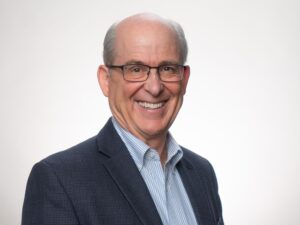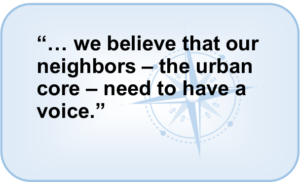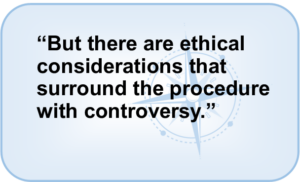Richard Butin, MD: The Making of an Ethics Champion

Straight out of his internal medicine residency at Cleveland Clinic in 1986, Dr. Richard Butin joined a large internal medicine physicians group in Kansas City and hoped to join the Ethics Committee at Research Medical Center, but an opening never occurred.
Richard left private practice in 2001 to join the faculty of UMKC School of Medicine as a docent and assistant professor, practicing internal medicine at University Health (UH) – formerly Truman Medical Center –– and teaching students and residents. He continues to teach as an Associate Professor.
When Richard expressed interest in ethics to Dr. William Jennings, chair of the Ethics Committee at Truman, Dr. Jennings welcomed him to join. He’s been a member ever since and Chair of the committee since 2011 when Dr. Jennings retired.
The Center for Practical Bioethics is proud to honor Richard as Ethics Champion of the Year in recognition of his leadership in addressing complex ethical issues in health and healthcare. With decades of real-world experience, he has earned the deep respect of colleagues and the lasting trust of the communities he serves.
Inclusive Mindset
“I like to joke that with 36 members we have the largest Ethics Committee in the world,” said Richard. “UH is the safety net institution for Kansas City, and we believe that our neighbors – the urban core – need to have a voice.”
safety net institution for Kansas City, and we believe that our neighbors – the urban core – need to have a voice.”
“Dr. Butin’s commitment to allow for a rather large committee that is inclusive of a variety of multidisciplinary members, members from the community, and representation from the Patient Advisory Council most likely does the most to contribute to the success and visibility of the Ethics Committee,” said Mitzi Cardenas, Executive Chief Administrative Officer at UH, who nominated Richard as the Center for Practical Bioethics’ 2025 Ethics Champion of the Year.
Together with Dr. Jennings, Richard developed the curriculum for a new elective in Hospice and Palliative Medicine, which he continues to teach today, and he continues to lead the UH Palliative Care Team in its work to provide compassionate care that is respectful to the physical, emotional and spiritual needs and wishes of patients and families.
The NRP Challenge
As liaison to the Medical Executive Committee, Richard advocates for the work of the Ethics Committee and keeps leadership abreast of ethical issues addressed at the hospital.
“We regularly deal with the usual subjects,” he says. “Capacity issues, the difference between capacity and competence, who are the agents making decisions when there’s no durable power of attorney.”
The articulation of UH’s policy for allocation of scarce resources – a prominent issue during the pandemic – was an important Ethics Committee-led project.
“But the number one issue for the committee now is NRP. We’ve been talking about it for almost two years.”
NRP – normothermic regional perfusion – is a technique used in organ procurement that involves restoring blood flow and oxygenation to the donor’s organs after circulatory arrest, making them more suitable for transplantation. But there are ethical considerations that surround the procedure with controversy.
flow and oxygenation to the donor’s organs after circulatory arrest, making them more suitable for transplantation. But there are ethical considerations that surround the procedure with controversy.
“The procedure and question of adoption have given rise to numerous conversations on the subject,” said Cardenas. “Dr. Butin has navigated these conversations with grace, describing a rather complex procedure in a manner that was understandable to those on the committee who are not medical practitioners surgeons.”
“I’m probably going to spend the rest of my ethics career exploring it,” he said. “Organ procurement policies and the definition of death – it’s really important that we do it right.”
It’s the Terminology
Another issue that comes up every month at Ethics Committee meetings, said Richard, is Medical Aid in Dying. “I’ve told our committee that MAID is coming. It’s been proposed in the legislature every year and we need to be prepared at our hospital.”
Noting that the American Medical Association in June decided not to change their terminology from Physician Assisted Suicide to MAID, for Richard such actions demonstrate the power of terminology in healthcare ethics.
“If you change terminology,” he said, “you change attitudes. We saw in the evolving marijuana laws, as well as ethical issues at the beginning and now the end of life.”
For healthcare providers, the tension underlies the bigger issue of conscience. Should a doctor or nurse have to participate in care that goes against their values, or should the provider not be allowed to impose their values on their patients?
Teacher and Connector
Richard’s greatest joy – and gift to others – is his passion for building relationships.
One thing that attracted him from private practice to Truman Medical Center was the opportunity to teach medical students in UMKC’s six-year BA/MD program, as well as residents in the hospital. As a docent for 22 years, he was paired with students to provide mentorship and guidance through all four years of their clinical experience.
Richard has been a regular participant in Center for Practical Bioethics’ Ethics Committee Consortium meetings over the years.
“I enjoyed going to different hospitals across the region that participated in the Consortium, sitting around the table with different people, realizing that we’re all doing and dealing with the same issues, being assured that we’re not off track – with the Center as an anchor,” he said.
Ethics Leader
The reason, he says that he puts himself in positions of leadership is because he likes connecting and bringing people together.
A Fellow of the American Academy of Hospice and Palliative Medicine, he chaired their ethics special interest group. For the American Society of Bioethics and Humanities, he chaired their palliative care affinity group.
A Fellow of the American College of Physicians, in 2023 he was honored by the Missouri Chapter with the Laureate Award, which recognizes individuals who have demonstrated commitment to excellence in medical care, education, research, and service to their communities and the College.
Other organizational involvement includes the Missouri State Medical Association and the Kansas City Medical Society, where he represented Research Medical Center and then Truman Medical Center on the Board for over 10 years. He served three years on the Board of Samuel U. Rodgers Health Center.
Both Richard’s father and grandfather were physicians. Married to Donna, whom he met during his residency at Cleveland Clinic, he is the oldest of four children born and raised in Wichita, Kansas. Richard and Donna have two children, Andrew and Betsy, and four grandchildren, Freddy, 5, and Teddy, 3, who, much to their delight, live nearby, and Evangeline, 4, and Matisse, 2, in Dallas.
A devout Christian, member of the Christian Medical and Dental Association, and Colonial Presbyterian Church, Richard thinks “being a healthcare provider you don’t need to abandon your personal beliefs and values, but you do need to give everyone’s values the respect they deserve.”
The Center for Practical Bioethics is proud to honor Dr. Richard Butin as Ethics Champion of the Year at the Breakfast of Champions Event on September 18, 2025.
Learn More about Clinical Ethics Services and the Ethics Committee Consortium
Written by Trudi Galblum, Marketing, Communications, and Grant Writing








